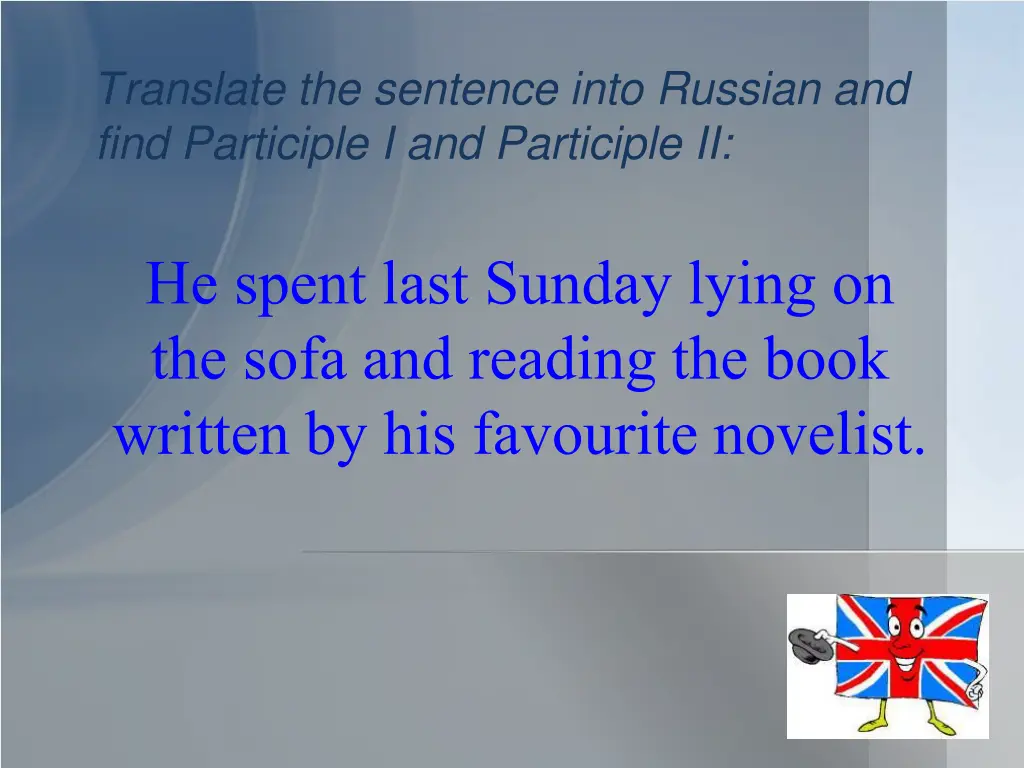
Understanding Participles in Russian and English - Examples and Practice
Learn about participles in Russian and English, including Participle I and Participle II. Find examples in sentences, identify forms of participles, complete sentences with the correct participles, and more in this comprehensive guide.
Download Presentation

Please find below an Image/Link to download the presentation.
The content on the website is provided AS IS for your information and personal use only. It may not be sold, licensed, or shared on other websites without obtaining consent from the author. If you encounter any issues during the download, it is possible that the publisher has removed the file from their server.
You are allowed to download the files provided on this website for personal or commercial use, subject to the condition that they are used lawfully. All files are the property of their respective owners.
The content on the website is provided AS IS for your information and personal use only. It may not be sold, licensed, or shared on other websites without obtaining consent from the author.
E N D
Presentation Transcript
ranslate the sentence into Russian and find Participle I and Participle II: He spent last Sunday lying on the sofa and reading the book written by his favourite novelist.
English Participle English Participle
(Participle) , : - ( , ), - ( ? ) - ( , ).
Participle Participles s (Present) Participle I (Past) Participle II V+ing writing V+ed / V3 written
Participle I : painting , ; reading , ; selling , ;
Participle II - -ed to, - (V3). Participle II : painted ; written ; sold ;
Translate the sentences and define the forms of the participles: 1. Laughing the girls ran out of the classroom. 2. The trees growing in front of the school were given to us as a present. 3. Feeling very tired, she went to bed early. 4. Have you noticed the broken kitchen window? 5. At 9 o clock the finished work was lying on my boss s desk. 6. The book read by him is called "The Christmas Story". 7. The reading boy didn't pay any attention to the teacher's words. 8. The news brought by my friend was exciting.
Complete the sentences with Participle I or Participle II: 1. The book was so (exciting/excited) that I couldn t put it down. 2. We were (shocking/shocked) when we heard the news. 3. Books (borrowing/borrowed) from the library must be returned in two weeks. 4. I saw a woman (standing/stood) in the corner on her own. 5. The window (breaking/broken) in the storm last night has just been repaired. 6. There were some children (swimming/swum) in the river. 7. Not (knowing/known) what to do, she burst out crying. 8. Emma was sitting in an armchair (reading/read) a book.
Tell what you can see in the pictures. Use Participle I. 1 2 3 5 6 4
9 8 7 11 10
Open the brackets using Present Participle Active and Passive: 1. (To impress) by the film, they kept silent. 2. (To lose) the textbook, the student couldn t do his homework. 3. He spent the whole day (to read) a book. 4. (To travel) around America for a month, she returned to England. 5. He watched Mike (to go) out of the door and (to cross) the street. 6. The question (to discuss) now is very important. 7. (To pack) in the beautiful box the flowers looked very lovely. 8. (To walk) in the park, they heard a man calling for help. 9. (To show) the wrong direction, the travellers soon lost their way.
Open the brackets. Use Participle I or Participle II. 1. Who is that boy (do) his homework at that table? 2. The (lose) dog was found at last. 3. Name some places (visit) by you last year. 4. The floor (wash) by Helen looked very clean. 5. Read the (translate) sentences once more. 6. The book was so (excite) that I couldn t put it down. 7. A lot of people (invite) to the party cannot come. 8. She was lying in the middle of the road, (cry) for help. 9. There were some people (swim) in the river.
Check your works. 1. Who is that boy doing his homework at that table? 2. The lost dog was found at last. 3. Name some places visited by you last year. 4. The floor washed by Helen looked very clean. 5. Read the translated sentences once more. 6. The book was so excitingthat I couldn t put it down. 7. A lot of people invited to the party cannot come. 8. She was lying in the middle of the road, crying for help. 9. There were some children swimming in the river.
Home Task TB ex. 6, p.76 TB ex. 10 (A,B), p.79
Express your opinion: It was interesting / useful / useless for me to Now I know how to Now I can But I can t
